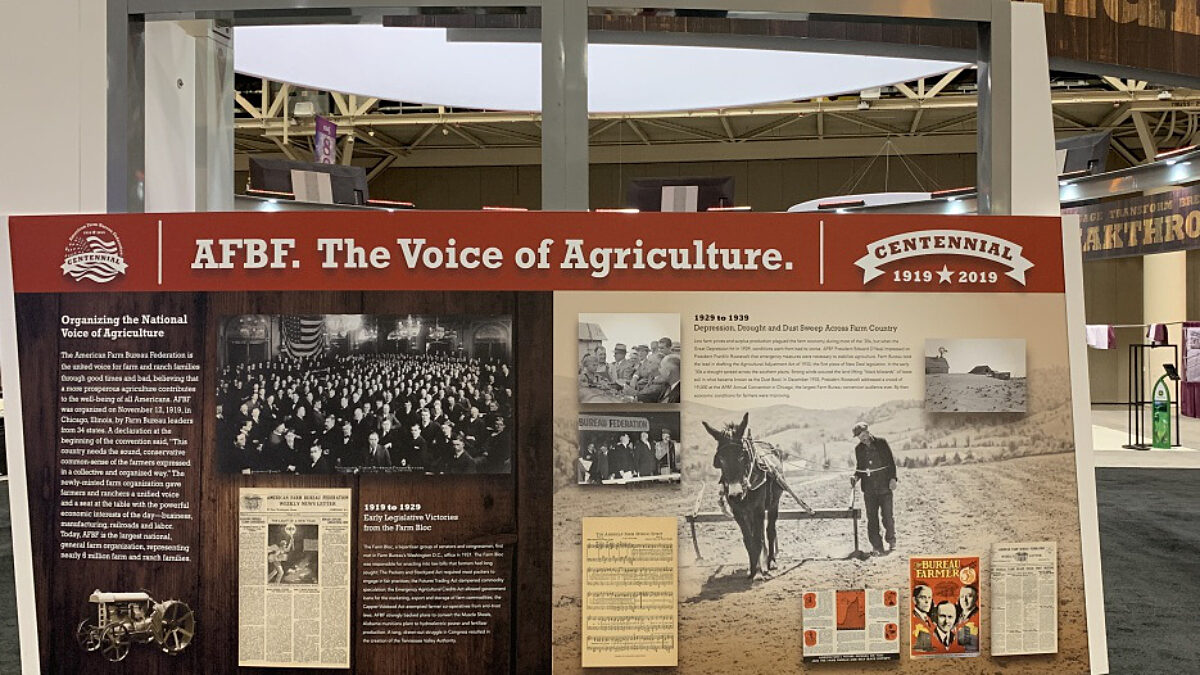Why Has the American Farm Bureau Been Successful for 100 Years?
Guest Author
Special Contributor to FB.org

photo credit: AFBF
Guest Author
Special Contributor to FB.org
By Stewart Truelsen
It’s a bit ironic that Sears is teetering on verge of liquidation and the American Farm Bureau Federation is still going strong after 100 years. In the early days of the Farm Bureau movement, Julius Rosenwald, president and later chairman of Sears, made financial grants to counties willing to hire an agricultural agent. This helped lead to the growth of county Farm Bureaus.
When the American Farm Bureau Federation was formed in Chicago in 1919, its mission was to promote, protect and represent farmers by coordinating the work of state Farm Bureaus. One reason for its success is its impeccable timing. A year earlier the nation was in the grips of the worst flu pandemic in history. Prior to that was World War 1, so 1919 was the first year farmers could really get together on a national organization. The automobile and telephone were coming on and that meant farmers were less isolated and more able to join together.
The quality of leadership at all levels is a key reason for Farm Bureau’s growth and success.
The American Farm Bureau met an immediate need. Agriculture was the nation’s biggest business, but it had no voice or seat at the table with the major economic interests of the day—business, manufacturing, railroads and labor.
Throughout its history the American Farm Bureau Federation had outstanding leaders. The quality of leadership at all levels is a key reason for Farm Bureau’s growth and success.
Edward A. O’Neal of Alabama was AFBF president during the Great Depression and Dust Bowl. Farm Bureau history almost ended there. It was the worst of hard times for agriculture. But O’Neal had the ear of the newly elected U.S. president, Franklin Roosevelt. He convinced Roosevelt that drastic action was needed and the result was the Agricultural Adjustment Act of 1933, the first farm bill. Farm Bureau action helped end the Great Depression.
Farm Bureau is a grassroots organization and that is another reason for its success. It was organized first at the county level. State Farm Bureaus and the American Farm Bureau followed. Shortly after AFBF set up shop in Washington, D.C., to lobby Congress, the “Farm Bloc” was formed. This bipartisan group of senators and representatives passed farm legislation that had been bottled up for years. Farm Bureau pioneered grassroots lobbying and still uses this strategy effectively today.
Farm Bureau also has been the voice of reason over the years. During the farm credit crisis of the 1980s the American Farm Bureau was criticized because some farmers wanted the voice of agriculture to be a shout. But the organization never subscribed to tractorcade protests and strikes to get its way. During the crisis, Farm Bureau did what it does best: find a solution to the problem. The result was a debt restructuring program that eventually helped those farmers who could be saved from bankruptcy.
From its early years, Farm Bureau has always been inclusive of women and young people. The same year the amendment giving women the right to vote was ratified, 1920, the American Farm Bureau formed a women’s committee, and two women were featured speakers during the general session of its annual convention. Farm Bureau started a rural youth program in the 1940s that is a major success today. Now called the Young Farmers & Ranchers program, it focuses on developing farm and community leaders for the future.
Throughout its history the American Farm Bureau has been incredibly innovative. It was most likely the first organization to produce its own motion pictures. These silent films were often shot on location and then edited in Chicago, which preceded Hollywood as a film capital. The films were used for recruitment and also addressed topics like fire safety.
As early as 1933, AFBF was investigating the possibilities of producing alcohol motor fuel from corn and other farm commodities. In the 1950s it focused on expanding world trade. A Farm Bureau staffer who was an army officer in charge of food distribution in Europe after the war devised a plan to send badly needed surplus farm products overseas. Public Law 480, better known as Food for Peace, became the most important foreign food assistance program ever undertaken by the government.
The American Farm Bureau also facilitated the growth of state Farm Bureau insurance companies that served the needs of farm families with inexpensive insurance products. In 1948, Farm Bureau fire and casualty companies along with AFBF formed a national reinsurance company, American Agricultural Insurance Company, to backstop large insurance risks. Insurance products tailored to rural needs played a significant role in the growth of Farm Bureau membership.
Finally, the American Farm Bureau has been successful because it is respected worldwide and represents the strong values and beliefs of rural America—freedom, faith in God and country, hard work, perseverance and more. One of its strongest beliefs is the freedom to own private property. Farm Bureau has been a strong defender of property rights because without it, American agriculture as we know it would not exist.
Unfortunately for Sears, the retail marketplace may no longer need it, despite the many years it served American families so well. But the American Farm Bureau is still vitally needed as it starts its second century.
Stewart Truelsen is a food and agriculture freelance writer and a regular contributor to the Focus on Agriculture series.
Trending Topics
VIEW ALL